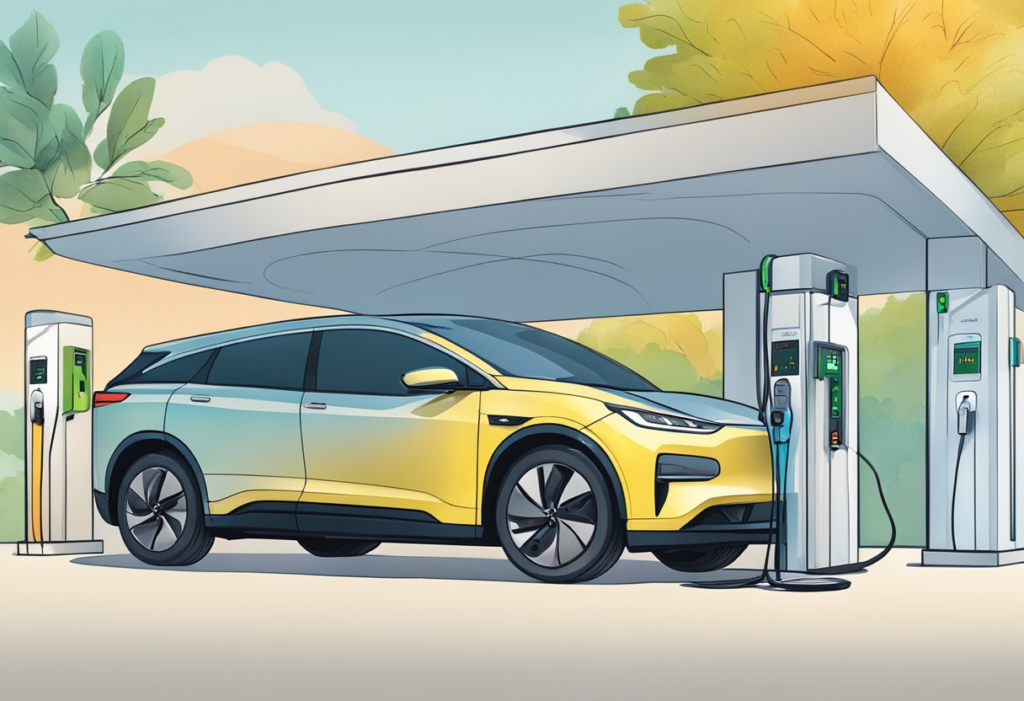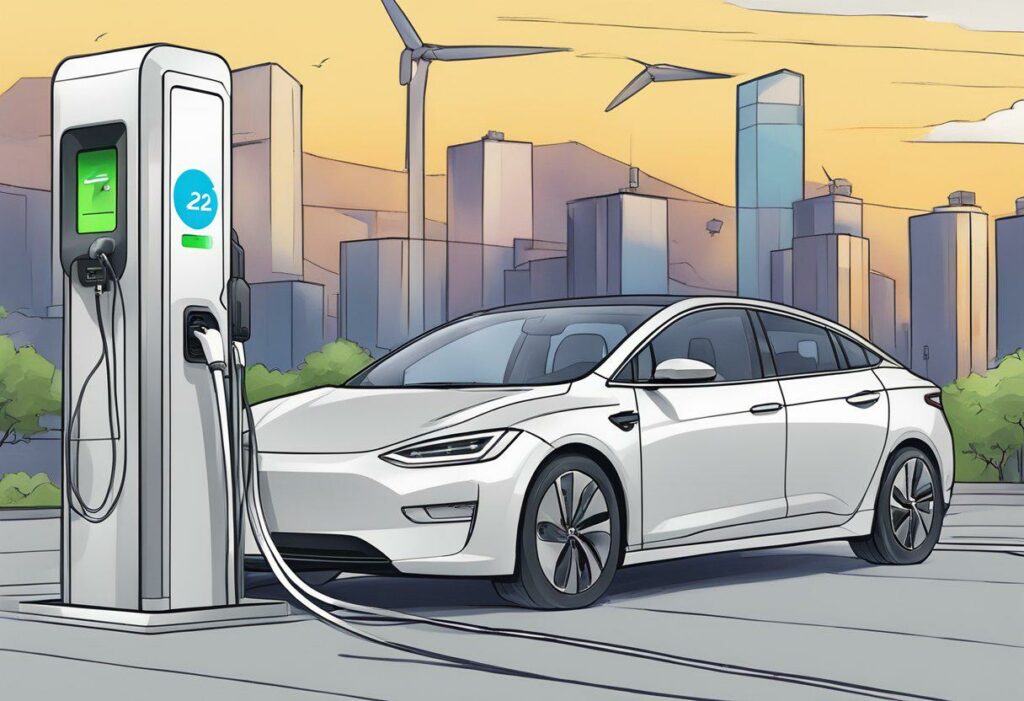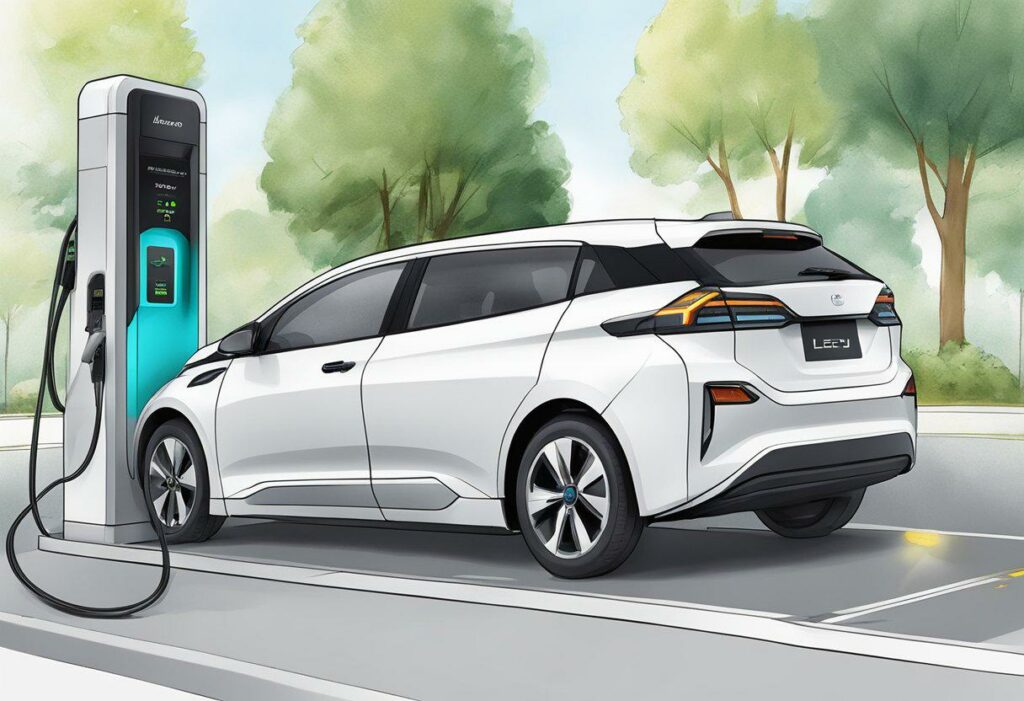Table of Contents
More people are using electric cars, so it’s important to know about the different ways to charge them. One commonly used option is the Level 2 EV charger, which offers a balance of charging speed and installation requirements. This charger needs certain power setups, so it’s good for home and business use.
Level 2 EV chargers provide an efficient and convenient charging solution compared to the slower Level 1 charging. These chargers use more electricity and need special outlets to work. Before you install one, make sure your home, office, or charging spot can handle it. Check out this guidance on Level 2 EV charger power requirement guide!
Key Takeaways
- Level 2 EV chargers offer faster charging compared to Level 1 chargers
- Understanding the power requirements of Level 2 chargers is essential for successful installation
- Level 2 chargers are suitable for various settings, including residential and commercial locations
Understanding Level 2 EV Chargers

Having a Level 2 charger at home makes charging your electric car fast and easy, giving you a handy way to always keep it ready to drive.
Level 2 chargers in the US work between 3 and 19.2 kW, letting them charge your car for 10 to 75 miles in an hour. So, for most daily drives, like going to work and back, you won’t have to wait long to charge your car.
Before you decide to install a Level 2 charger, it’s essential to understand the power requirements. In most cases, these chargers need a 240-volt electrical supply, which means your home may require an upgrade if it is not already equipped with a suitable outlet. The cost of installing a Level 2 charging station may range from $500 to $2,000, depending on your home’s existing electrical capacity and the equipment you choose.
When you set up a Level 2 charger, make sure it matches your electric car. Luckily, most charging stations work with many types of electric cars, so it’s usually easy to find one that fits your needs.
Choosing a Level 2 EV charger can save energy and money over time. Because it charges faster, you wait less and can use your electric car more for everyday drives and commutes.
Power Requirements of Level 2 EV Chargers

Input Voltage and Current
When it comes to installing a Level 2 EV charger in your home, there are different voltage and current levels to consider. Level 2 chargers operate optimally at 240V, which allows for faster charging compared to a 120V Level 1 charger. But remember, how fast the charger works can change based on its amperage.
Common current levels for Level 2 chargers are:
- 16 amps: suitable for smaller electric vehicles with a lower charging capacity
- 24 amps: a good balance between charging speed and installation cost
- 32 amps: ideal for most electric vehicles, providing a faster charge
- 40 amps: typically used for electric vehicles with a higher charging capacity
- 48 amps: maximizes charging speed, especially for vehicles with greater power acceptance
It’s important to pick a charger that lets you adjust the charging speed to meet your electric car’s power needs.
Power Output and Charging Time
The input voltage and current levels influence the power output and charging time of a Level 2 EV charger. Level 2 chargers can charge at speeds between 3.3 kW and 17.2 kW, giving your car 10 to 52 miles of range in an hour. This is a lot faster than using a Level 1 charger.
Here’s a quick overview of the charging speeds and times for different amperage levels:
| Amperage | Power Output | Electric Range per Hour | Charge Time for 100 Miles |
| 16 amps | 3.8 kW | 12-16 miles | 6-8 hours |
| 24 amps | 5.7 kW | 18-24 miles | 4-5 hours |
| 32 amps | 7.7 kW | 25-32 miles | 3-4 hours |
| 40 amps | 9.6 kW | 32-40 miles | 2.5-3 hours |
| 48 amps | 11.5 kW | 40-52 miles | 2-2.5 hours |
Remember, these numbers can change based on your electric car’s battery and power needs. To use your Level 2 charger best, choose the right voltage and current levels for your car. This makes sure it charges quickly and well overnight, so it’s ready to go when you are.
Level 2 Vs. Other Chargers
Level 2 Vs. Level 1 Chargers
For charging electric cars, you can use Level 1 or Level 2 chargers. Level 1 chargers use a regular 120V outlet and charge your car slowly, usually taking 8 to 20 hours for a full charge. They’re good for short daily trips, giving about 2 to 5 miles of driving range each hour they charge.
In contrast, Level 2 chargers have a 240V power supply and can significantly speed up the charging process. These chargers deliver 10 to 75 miles per hour of charging. To better understand the difference, let’s compare Level 1 and Level 2 chargers in terms of power requirements:
| Power Requirement | Level 1 Charger | Level 2 Charger |
| Voltage | 120V | 240V |
| Amperage Range | 12-16A | 16-80A |
| Charging Speed | 2-5 miles per hour | 10-75 miles per hour |
Installation Requirements For Level 2 Chargers
Home Installation
When installing a Level 2 EV charger at your home, you will need a dedicated 240-volt circuit. Typically, this requires a NEMA 14-50 outlet or a hardwired connection. For single-family residences, it is best to consider an indoor installation to protect the equipment from the elements. You may also need to add subpanels or upgrade your existing electrical capacity.
Here are some key points to keep in mind when installing a Level 2 charger on your residential property:
- Have a dedicated 240-volt circuit
- Choose between a NEMA 14-50 outlet or a hardwired connection
- Consider an indoor installation for added protection
Commercial Installation
If you’re putting Level 2 chargers in a business or workplace, check the building’s electrical system and plan for using more than one charger, since commercial spots often need to charge lots of electric cars. Setting them up might mean extra wiring and upgrades to manage higher power use.
Some factors to consider when installing Level 2 chargers at commercial locations include:
- Assessing the building’s electrical capacity
- Planning for multiple chargers
- Expecting additional wiring work and possible upgrades
Installation by a Professional Electrician
In both home and commercial installations, it’s crucial to have a professional electrician perform the work. Having a professional install your Level 2 charger will ensure a safe and reliable charging experience.
Remember these points when working with a professional electrician:
- They can ensure proper wire sizing and circuit breakers
- Ensure local code compliance
- Provide a safe and reliable charging experience
By sticking to these tips and teaming up with a skilled electrician, you can have handy Level 2 EV charging at your home or work.
Public Charging Stations Vs Level 2 Chargers
Level 2 Chargers in Public Charging Stations
More places like restaurants, malls, and parking lots are adding Level 2 charging stations for electric car owners. These public chargers are faster and handier than Level 1 chargers, making it easier for you to charge on the go.
When you use a Level 2 charging station at a public location, you can benefit from a faster charging time compared to a standard 120-volt outlet. Level 2 chargers utilize a 240-volt power supply, which significantly reduces the time it takes to recharge your EV’s battery. This means you can typically charge your battery to 80 percent in just a few hours while you’re shopping, dining, or attending an event.
But remember, the speed of Level 2 charging stations can change based on things like your electric car’s battery size, the power available, and the type of charging station.
Some benefits of using Level 2 chargers in public spots include:
- Faster charging time: You can charge your EV much quicker than with Level 1 chargers, which is especially useful when you are out and about.
- Easy to find: Lots of public spots have Level 2 charging stations, so you can charge your car while you’re out and about.
- Charge while you do other things: Your car can charge while you shop, eat, or visit places, saving you time and effort.
In short, using Level 2 chargers in public areas gives you a quick and easy way to charge your electric car. Knowing the pros and cons of these stations helps you plan your drives and charging stops to fit your life and needs.
Special Features of Level 2 Chargers
Level 2 chargers have some cool features that make them different and often better than Level 1 chargers for people with electric cars. Let’s explore some of these special features.
One of the key advantages of Level 2 chargers is their functionality. Level 1 chargers use a normal 120-volt outlet, but Level 2 chargers use a stronger 240-volt source, letting you charge your electric car or plug-in hybrid quicker. Depending on your car and charger type, you might get about 25 miles of driving range for each hour of charging.
Several common connectors are used in Level 2 chargers to ensure compatibility with a wide range of electric vehicles. The J1772 connector is a universal charging port widely used in North America. The CHAdeMO and CCS connectors are designed for fast charging certain vehicles and can handle more power. The Tesla Connector is made just for Tesla cars, making charging easy for Tesla owners.
Level 2 chargers have special features that make them stand out. Some let you check and control your charging from far away using Wi-Fi or cell service, which is handy if you share chargers or have more than one car.
Many Level 2 chargers can also balance power use and work with utility programs to ease pressure on the electric grid, making your charging efficient and possibly saving you money. Plus, some can take different kinds of payment, which is useful for shared chargers in public parking spots.
Safety is key in today’s EV charging stations. High-quality Level 2 chargers are certified safe, keeping you and your car protected while charging. They’re also built to be used outdoors, making them a sturdy option for homeowners, businesses, and renters.
Cost Analysis for Level 2 Chargers
Investing in a Level 2 charger for your electric vehicle (EV) is a wise decision for many reasons. It can save you time, provide convenience, and reduce your dependence on public charging stations. Understanding the costs involved in this decision is important, so let’s dive into it.
First, consider the cost of the charging unit. You can expect a Level 2 charger to be priced between $300 and $700. This cost is for the charging unit itself, and many factors can influence it, such as the brand, power level, and any additional features it offers.
Next, you’ll need to think about installation expenses. Labor costs vary depending on factors like your home’s electrical infrastructure, the need for panel upgrades, and your location. If a 240V outlet is not available, additional wiring may be required, increasing the labor cost.
When it comes to the electricity bill, Level 2 chargers can draw anywhere from 3 to 19.2 kilowatts (kW) of power, providing 10 to 75 miles of range per hour of charging. Most EVs charging at home on a 240-volt charger will draw about 7,200 watts. To estimate your electricity bill, multiply the charger’s power draw (kW) by your electricity rate (typically in dollars per kilowatt-hour) and the hours of usage.
For example, let’s say your EV charger has a power draw of 7.2 kW, and your electricity rate is $0.12 per kWh. If you charge your car for 4 hours each day:
- Power draw: 7.2 kW
- Electricity rate: $0.12 per kWh
- Total charging time per day: 4 hours
- Daily electricity cost: 7.2 kW × $0.12/kWh × 4 hours = $3.46
Remember, these are rough estimates and actual costs might be different due to your car’s charging efficiency, the charger’s power level, and current electricity prices. Also, some power companies give discounts to EV owners, which might reduce charging costs.
In short, initial costs for a Level 2 charger include the price of the unit and installation. For ongoing costs, multiply the power used by your electricity rate and how long you charge. This info can help you decide wisely about getting a Level 2 charger for your home.
Safety and Convenience of Level 2 Chargers

Level 2 chargers provide a safe and convenient way for you to charge your electric vehicle (EV). They have a charging speed range between 3 and 19.2 kilowatts (kW) in the United States and up to 22 kW in Europe. It means you can charge your EV in less than half the time it takes with a Level 1 charger, typically between 4-10 hours from empty. This level of convenience is helpful for quickly charging your vehicle at home, workplace, or public settings.
Safety is a priority when it comes to Level 2 EV chargers. These chargers are designed and tested to meet strict safety standards. Many chargers have safety certifications from recognized organizations. These certifications ensure that the chargers have passed rigorous tests and comply with essential safety requirements. A certified charger will give you peace of mind, knowing you can charge your EV without concern.
Another factor that adds to the convenience of Level 2 chargers is their ability to deliver approximately 10 to 75 miles (16 – 120 km) of range per hour of charging. This performance enables you to plan your trips and charging breaks efficiently, ensuring that you can get back on the road quickly. Additionally, many Level 2 chargers come with smart features, such as:
- Smartphone integration to monitor charging progress
- Scheduling for off-peak charging to save on electricity costs
- Usage analytics for a better understanding of your charging habits
When considering the installation of a Level 2 charger at your home, it’s crucial to take into account your existing electrical capacity. Depending on your setup, the installation cost might be between $500-$2,000 or even nothing if you already have a compatible 14-50 outlet. This investment is worthwhile, considering the added safety, convenience, and long-term savings that come with owning a Level 2 EV charger.
In summary, Level 2 chargers provide you with a safe and convenient way to charge your EV, making them a reliable choice. Their safety certifications and practical benefits, like faster charging times, smart features, and more efficient planning, make them an attractive option for everyday use. So, as you consider an EV charging solution, remember these aspects to make the most of your charging experience.
FAQs
What are the power requirements for a level 2 ev charger
A Level 2 EV charger delivers single-phase, 208-240V of alternating current at power levels ranging from 3.3 kW to 19.2 kW. It requires a connection to a compatible 208-240V outlet in your home or at a charging station.
How does the charging speed of a Level 2 charger compare to others?
Level 2 chargers can charge your electric vehicle much faster than Level 1 chargers, which come with the vehicle and use a standard wall outlet. A typical Level 2 charger provides up to 32 miles of driving range per hour of charging. In contrast, a Level 1 charger only provides around 4 miles of driving range per hour.
What is the installation process for a Level 2 charging station?
To install a Level 2 charging station at your home, you may need the help of a professional electrician. If your home already has a 14-50 outlet, installing the charger might not cost anything. However, if your home’s existing electrical capacity needs to be upgraded, installation costs could range between $500-$2,000.
What type of circuit breaker is suitable for a Level 2 EV charger?
A Level 2 EV charger usually needs a dedicated circuit breaker with a current rating of 40 or 50 amps. It helps ensure that the charger is protected from electrical overloads and any potential damage to your electric vehicle or charging equipment.
Is a 30 amp or 50 amp charger better for electric car charging?
A 50-amp charger usually charges electric cars faster than a 30-amp charger, which can be especially helpful if you often drive long distances or have a lengthy daily commute. It ensures your electric vehicle charges fully and quickly, ready for your next journey.
What is the energy consumption of a Level 2 EV charging station?
The energy a Level 2 EV charging station uses depends on your car’s battery size and how much you drive each day. For instance, if you commute 35 miles, you’ll need about 12.5 kilowatt-hours (kWh) of charge daily. With a Level 2 charger, you can get that energy back in 1-3 hours, depending on the charger’s power. But remember, actual energy use can change based on the car, charger, and other things.